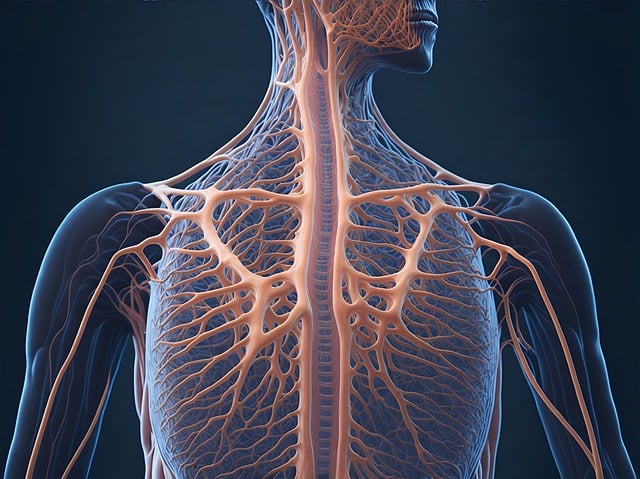The Endocannabinoid System (ECS) is a complex biological network essential for maintaining human body balance (homeostasis), regulating key functions like appetite, pain, mood, and memory. Discovered independently of cannabis' THC, ECS comprises endocannabinoids, receptors (CB1 and CB2), and enzymes that facilitate communication between body systems in response to internal and external stimuli. Imbalances in the ECS can lead to various health issues, highlighting the importance of understanding its role for optimal well-being. Lifestyle choices, plant-based solutions like CBD from hemp or cannabis, and scientific advancements aim to support and harness the ECS's potential for improved health outcomes.
Maintaining balance is vital for overall health, and the endocannabinoid system (ECS) plays a crucial role in this process. This complex physiological system helps regulate various bodily functions, from mood and memory to pain perception and appetite. In this article, we’ll explore the intricate workings of the ECS, delving into the science behind cannabinoids’ ability to maintain homeostasis. We’ll also discuss common imbalances, their impacts, and natural ways to support ECS health through lifestyle choices and plant-based solutions.
What is the Endocannabinoid System?

The Endocannabinoid System (ECS) is a complex physiological system involved in maintaining balance within the human body, often referred to as homeostasis. It plays a crucial role in regulating various physiological processes, including appetite, pain sensation, mood, and memory. The ECS is named after the cannabis plant, as its discovery was initially linked to the effects of tetrahydrocannabinol (THC), one of cannabis’s primary compounds. However, scientists have since realized that this system operates independently of exogenous cannabinoids like THC.
Understanding the ECS involves recognizing three key components: endocannabinoids, receptors, and enzymes. Endocannabinoids are endogenous lipids produced by our bodies, such as anandamide and 2-AG, which act as neurotransmitters, binding to specific receptors in the brain and other organs. These receptors, primarily CB1 and CB2, are part of a larger family of G protein-coupled receptors. Enzymes, like fatty acid amide hydrolase (FAAH), control the degradation of endocannabinoids, ensuring their effects are temporary and balanced. This intricate system helps maintain optimal health by facilitating communication between different body systems, allowing for efficient responses to internal and external stimuli.
The Role of Cannabinoids in Maintaining Balance

The role of cannabinoids in maintaining balance is a fascinating aspect of our body’s intricate systems. Cannabinoids, with their unique ability to interact with the Endocannabinoid System (ECS), play a pivotal role in regulating various physiological processes that contribute to overall health and homeostasis. Understanding the ECS is key to comprehending this dynamic relationship.
This system, comprised of endocannabinoids (produced by our bodies), receptors (CB1 and CB2), and enzymes responsible for their synthesis and degradation, acts as a modulator, ensuring balance within the body’s complex network. Cannabinoids, such as THC and CBD found in cannabis, mimic endocannabinoids and bind to these receptors, influencing nerve signals and helping to maintain optimal functioning. This interaction can have profound effects on mood, memory, pain perception, appetite, and even inflammation, ultimately supporting the body’s natural balance.
How the Body Regulates This System

The body’s ability to maintain balance, or homeostasis, is a complex process heavily reliant on the endocannabinoid system (ECS). This intricate network acts as a regulator, ensuring various bodily functions remain in check. The ECS is involved in numerous processes, including appetite, pain sensation, mood, memory, and sleep – all of which are vital for overall health and well-being.
Understanding the endocannabinoid system is key to grasping how our bodies maintain stability. It’s a feedback loop where endocannabinoids, produced by our bodies, bind to specific receptors, initiating a response that helps restore balance when homeostasis is disrupted. This dynamic system allows the body to adapt to internal and external stimuli, contributing to overall health and promoting a state of equilibrium.
Common Imbalances and Their Effects

The human body maintains a delicate balance through various systems, and one crucial player in this equilibrium is the Endocannabinoid System (ECS). This intricate system plays a vital role in regulating numerous physiological processes, including mood, memory, appetite, sleep, and pain sensation. However, when the ECS becomes imbalanced, it can lead to various health issues. Common imbalances include overactivity or underactivity of the endocannabinoids, which are chemical messengers that bind to receptors within the body.
Overactivation may result in increased inflammation, anxiety, and potential disruptions in sleep patterns, while underactivity is linked to chronic pain, reduced motivation, and impaired cognitive function. Understanding these imbalances is essential as it allows individuals to make informed decisions regarding their health and well-being. By recognizing the signs and addressing them early, one can promote optimal ECS functionality, thus achieving a state of balance that supports overall vitality and wellness.
Lifestyle Choices to Support ECS Health

The Endocannabinoid System (ECS) plays a pivotal role in maintaining balance within our bodies, regulating various physiological processes and contributing to overall well-being. To support ECS health, lifestyle choices can significantly make a difference. Engaging in regular physical activity, for instance, promotes the production of endocannabinoids, the body’s natural cannabis-like compounds that interact with the ECS. A balanced diet rich in omega-3 fatty acids, found in foods like fish and flaxseeds, is also beneficial as these essential nutrients help maintain ECS function.
Additionally, stress management techniques such as meditation, yoga, and adequate sleep are crucial. Chronic stress can disrupt the ECS, leading to imbalances that contribute to various health issues. By incorporating these practices into daily routines, individuals can help regulate their ECS, fostering a state of homeostasis and promoting optimal bodily functions.
Exploring Plant-Based Solutions for Balance

In today’s world, maintaining balance isn’t just about physical stability; it’s a holistic concept that encompasses mental, emotional, and even nutritional harmony. Exploring plant-based solutions offers an intriguing path to achieving this equilibrium. Many plants contain compounds that interact with our endocannabinoid system (ECS), a complex network of receptors in the body that regulates various functions, including appetite, mood, sleep, and pain sensation. Understanding the ECS is crucial when considering plant-based approaches.
For instance, certain herbs like hemp and cannabis are known for their potential to modulate the ECS. These plants contain cannabinoids, such as CBD (cannabidiol), which can positively impact our overall balance by promoting relaxation, reducing inflammation, and supporting a calm mind. This natural synergy between plants and the body’s ECS provides a promising avenue for those seeking sustainable balance in their lives.
Future Insights into Endocannabinoid Research

The future of endocannabinoid research promises exciting insights into maintaining balance within the body. As scientists continue to unravel the complexities of the endocannabinoid system (ECS), we can expect a deeper understanding of its role in various physiological processes, from pain management and appetite regulation to mood and memory. This knowledge will likely lead to innovative therapeutic approaches leveraging the ECS for conditions such as chronic pain, anxiety disorders, and metabolic imbalances.
With advancements in technology and an increasing body of preclinical evidence, future studies may explore the potential of targeted endocannabinoid modulation. This could involve developing more precise treatments that interact with specific receptors or enzymes within the ECS, offering personalized medicine options. Understanding the intricate balance of endocannabinoids and their receptors holds the key to unlocking new possibilities for enhancing overall well-being and promoting optimal health.
